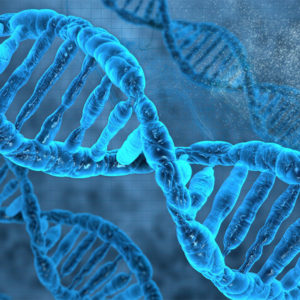Genomics of Rare Disease
27–29 March 2019
Wellcome Genome Campus, UK
Exploring how genomic research translates into clinical care and informs our understanding of the biology of rare disease
Summary
We are pleased to announce the 13th in our series of meetings on rare diseases, which will present an exciting blend of genomic science and clinical medicine. This meeting will explore how cutting-edge genomic research translates into clinical care and informs our understanding of the biology of rare disease.
The programme features the latest findings related to the genomic basis of rare diseases, providing powerful insights into human biology, disease mechanisms and therapeutic approaches. As genomic sequencing becomes more available in the hospital setting, we also examine the opportunities and challenges for clinical practice.
This year’s meeting will focus on large-scale whole genome sequencing studies and discuss the intersection of polygenic and monogenic disorders and the impact on our understanding of rare diseases. There will also be the opportunity for bioinformaticians working in this area to showcase the innovative tools that they have developed. We will also include sessions on the legal and ethical issues around sharing patient data and explore the new therapeutic approaches to rare diseases.
This conference provides an excellent multi-disciplinary forum for clinicians (consultants and trainees), research and clinical scientists, bioinformaticians and technology developers interested in understanding the impact of recent advances in genomics and technology on the care of patients with rare diseases.
Conference poster
Download the poster for Genomics of Rare Disease 2019 to share with your colleagues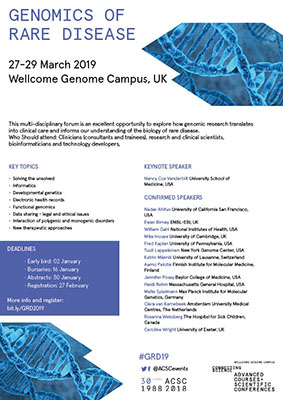
Programme
The conference will start at approximately 12.30 on Wednesday, 27 March and close at approximately 16.00 on Friday 29 March 2019.
Topics will include:
- Solving the unsolved
- Informatics
- Developmental genetics
- Electronic health records
- Functional genomics
- Data sharing – legal and ethical issues
- Intersection of polygenic and monogenic disorders
- New therapeutic approaches
Organisers and speakers
Scientific programme committee
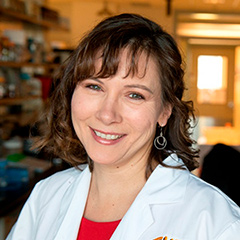
Kym Boycott
University of Ottawa, Canada
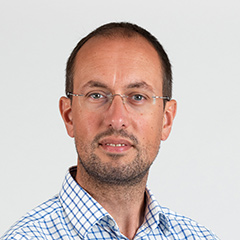
Matthew Hurles
Wellcome Sanger Institute, UK
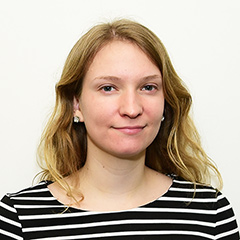
Kaitlin Samocha
Wellcome Sanger Institute, UK

Jay Shendure
University of Washington, USA

Lisenka Vissers
University Medical Centre Nijmegen, The Netherlands
Keynote speaker
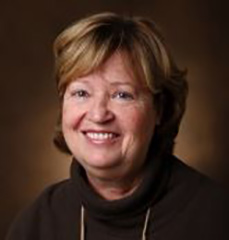
Nancy Cox
Vanderbilt University School of Medicine, USA
Confirmed speakers
Nadav Ahituv – University of California San Francisco, USA
Ewan Birney – EMBL-EBI, UK
William Gahl – National Institutes of Health, USA
Mike Inouye – University of Cambridge, UK Frederick Kaplan
Fred Kaplan – University of Pennsylvania, USA
Tuuli Lappalainen – New York Genome Center, USA
Katrin Männik – University of Lausanne, Switzerland
Aarno Palotie – Finnish Institute for Molecular Medicine, Finland
Jennifer Posey – Baylor College of Medicine, USA
Heidi Rehm – Massachusetts General Hospital, USA
Malte Spielmann – Max Planck Institute for Molecular Genetics, Germany
Clara van Karnebeek – Amsterdam University Medical Centres, The Netherlands
Rosanna Weksberg – The Hospital for Sick Children, Canada
Caroline Wright – University of Exeter, UK
Scientific Conferences Team
Treasa Creavin, Scientific Programme Manager
Zoey Willard, Conference & Events Organiser
How to apply
| Early bird discount (until 2 January) |
Standard rate (after 2 January) |
||
| Student | No accommodation | £178 | £278 |
| Student | On-site twin accommodation | £283 | £383 |
| Student | On-site single accommodation | £348 | £448 |
| Academic | No accommodation | £278 | £378 |
| Academic | On-site twin accommodation | £383 | £483 |
| Academic | On-site single accommodation | £448 | £548 |
| Commercial | No accommodation | £378 | £478 |
| Commercial | On-site twin accommodation | £483 | £583 |
| Commercial | On-site single accommodation | £548 | £648 |
The registration fee includes entrance to the lectures and poster sessions, an abstract book, meals (lunch and dinner) and refreshments during the conference. Breakfast will be provided for delegates who have booked accommodation.
Accommodation
Accommodation is provided for the nights of 27 and 28 March 2019, when booked with your conference registration. Please note: there is limited onsite accommodation and this will be allocated on a first-come, first-served basis. Therefore, early registration is recommended.
Accommodation is also available at the Holiday Inn Express, Duxford and the Red Lion Hotel, Whittlesford Bridge. Both are located near to the Whittlesford Parkway train station. A complimentary shuttle to and from the Wellcome Genome Campus Conference Centre will be provided. If you need other accommodation suggestions, please contact the conference organiser.
If you wish to book accommodation either side of the conference dates, please contact the Conference Centre, the Holiday Inn Express, Duxford or the Red Lion Hotel, Whittlesford Bridge directly.
Once available accommodation is sold out, the accommodation option will no longer be visible on the website.
Travel visas
Contact the conference organiser if you require a letter to support a travel visa application. Please note: letters will only be provided to confirmed registrants.
Non-European Economic Area or Swiss nationals may be required to have a visa to enter the UK.
Early application is strongly advised, as this process can take 6-8 weeks or longer.
Please visit the following websites for further information:
Accommodation services phishing scam – please be vigilant. More information.
Cost
A limited number of registration bursaries are available for PhD students to attend this conference (up to 50% of the standard registration fee) from Wellcome Genome Campus Scientific Conferences.
The following documents will need to be provided:
- Abstract
- CV
- Covering letter
- Letter from supervisor stating financial need
To apply, please contact the conference organiser.
Bursary deadline: 15 January 2019
Additional funding opportunities
Visit our support page for additional financial support currently available.
Abstracts
We welcome abstracts from all areas relevant to the main themes of the meeting, for both oral and poster presentations. Several oral presentations will be chosen from the abstracts submitted.
Abstracts will only be considered from registered delegates. Please use our online abstract submission system and follow the instructions given to ensure your abstract is submitted correctly. All abstracts must be submitted by the deadline. If you are intending to submit more than one abstract, please contact the conference organiser prior to registration.
The scientific programme committee will assess your abstract after the deadline has passed and you will be notified whether you have been selected for an oral or poster presentation.
Poster boards onsite will accommodate 118 cm high by 84 cm wide (A0- portrait) of printed material. Accepted abstracts will appear in the conference programme book and poster boards will be allocated at the conference.
Abstract deadline: 29 January 2019
If you have already completed your registration and then subsequently wish to upload an abstract, please follow the instructions below:
- Log back into your registration account using either Firefox or Internet Explorer as your browser (click on the “register” button on the event website and this will take you to a page where you can log on to your account).
- Click on “Account” (at the top right-hand side of the screen).
- Then click on “View account history”.
- This will show a table of your event registrations, with the right-hand column giving the options to “Upload file” – click on this and select to upload an abstract.
- Note that you will not receive another email confirmation that you have completed this, but it you wish to check that it has uploaded then you can log out of your account, then log back in again and you should then see your abstract attached to your registration.
Keynote lecture video from 2018 meeting
The generation of new sequence diversity
Keynote lecture by Kári Stefánsson (deCODE genetics, Iceland) at Genomics of Rare Disease 2018.
